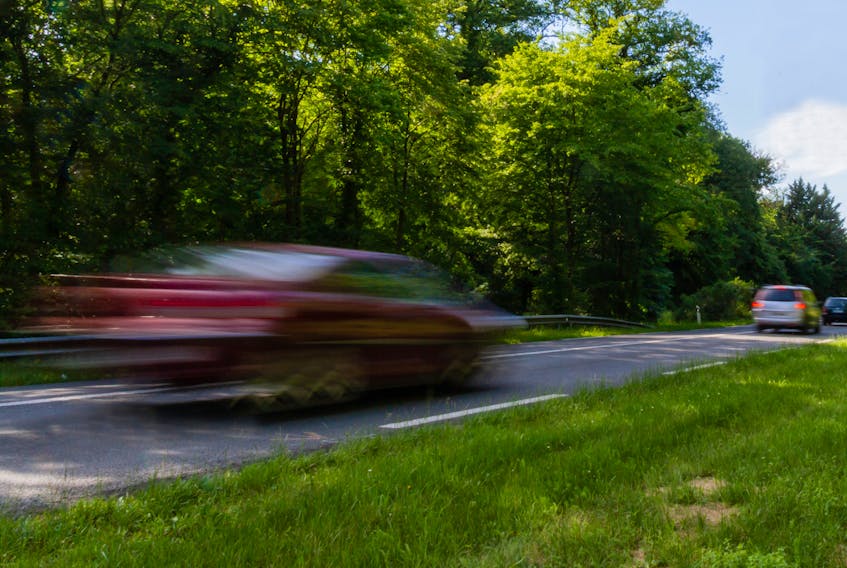People who fly away to exotic locales for their summer holidays won’t realize this amazing fact, which is known by everyone who takes staycations: it is possible to drive halfway across Newfoundland and never see a cop car.

Anarchy reigns on the province’s highways and byways, as serial speeders break the law whenever and wherever they want, with no worries that a ticket-toting police officer lies in wait or is on patrol.
Cop cars are so rare on the province’s highways that you don’t even see them outside of roadside Tim Hortons.
This is an unscientific guesstimate, but the average speed on the Trans-Canada Highway in Newfoundland seems to be in the range of 120 to 130 km/h.
The posted speed limit is, of course, 100 km/h, but most drivers take those signs as a mere suggestion, or, more likely, as a minimum speed.
The occasional sign reading “Slower traffic keep right” is apparently taken by the majority of drivers to mean they can go faster in the left lane, even if most drivers in the right lane are going the speed limit.
It comes down to this: speeders pose a danger to everyone on the road. Rebuttals that “I’m a good driver” are facile and irrelevant.
I will confess, without embarrassment or apology, that I am a right-lane driver. But I don’t go slow. I go the speed limit. So do the vast majority of other right-lane drivers. You seldom come across anyone going 80 or 90 km/h, and when you do, it’s usually because they’re pulling a boat or trailer, or the driver is a timid senior.
So there’s no excuse for using the left lane to barrel along at 30 km/h over the speed limit.
Well, yes, there can be an excuse — you can do it without much worry of being pulled over by an officer of the law.
Some people might not believe the incredible claim that you can drive 800 kilometres and not see a single cop car. But it is true.
We recently went to Fogo Island and back. Sure, there were a couple of RCMP officers stopped on a side road in Tilting for an amiable chat with a local fellow, but other than that … not a single cop on highway patrol. Not a single speeder pulled over, out of hundreds.
Owners of crew cabs — the most common offenders — will likely be among those who will point out that some other provinces have a speed limit of 110 km/h. Fine. But please explain, then, how this justifies you driving at 120 or 130 km/h. You’re still speeding.
The police also have some explaining to do. The culture is gradually changing, and more and more people are becoming fed up with the apparent immunity enjoyed by speeders.
It took decades for the public and the police to finally take impaired driving seriously enough to take action to catch and punish impaired drivers. We shouldn’t have to wait decades for a shift to occur regarding speeders.
It comes down to this: speeders pose a danger to everyone on the road. Rebuttals that “I’m a good driver” are facile and irrelevant. The proof can be found in the constant carnage and death that occurs on the province’s roads. The police will be the first to say the main causes of such motoring mayhem are alcohol or speed or both.
So why aren’t the cops patrolling, easily handing out hundreds of speeding tickets per day? It is a mystery. Perhaps chasing drug peddlers is more exciting. Perhaps they don’t have enough staff to chase every speeding crew cab. Perhaps the easy availability of donuts cuts into their patrol time.
Whatever the explanation, we need the excuses to end and action to begin.
The cops know speeding is a serious problem. They send out news releases whenever they make a dramatic bust, such as when they recently stopped a 21-year-old man in Labrador for going 155 km/h in an 80 km/h zone, or when they pulled over a 21-year-old man from Bay Roberts for going 152 km/h on the Trans-Canada Highway.
Is it only 21-year-old men?
No. Older guys and women — possibly the parents of 21-year-olds — are speeders as well.
Here’s a message for the cops: start ticketing more of them, or no donuts for you.
Brian Jones is a desk editor at The Telegram. He can be reached at [email protected].
RELATED:








